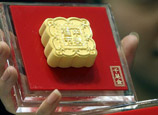
Part of the answer to that puzzle may come from companies in Zhongshan pooling their resources to form a cohesive group to tap global markets, experts suggest.
Ye from Golden Dragon thinks that while many small companies are keen to tap overseas markets, high exhibition costs can often prove a deterrent.
"They can run into hundreds of thousands of yuan and these amounts are often beyond the reach of small companies," he said.
Small or medium-sized companies can only expect to make sizable returns after they make considerable investment in overseas markets, he added, possibly with the help of local government and industry association funding.
Karl McCarrison, business development manager at Delta Strike, a manufacturer of laser tag equipment in the US, said that Chinese companies should invest more time to learn about target markets and how to develop or modify their products for them.
"Consumers or purchasers will identify more easily with products that reflect their culture and interests.
"If consumers are offered three different products at the same price they will obviously choose the product they identify with the most - but cost is crucial, too."
Lisa Hanson, managing partner and founder of Niko Partners, a consultancy focused on the Asian games market, said that it is vital for Chinese companies looking to enter a foreign market, to carry out thorough market research and due diligence.
"Chinese products will be competitive globally as long as the price is right and the quality is good, and most importantly they are backed by excellent customer service," added Hanson.
At the same time, it may not be easy for Western companies to promote their products in China, despite their success in other markets.
Hu Xiaochun, sales manager of Zone China System (Nantong) Co Ltd, said that there are significant cultural differences in the Chinese market.
















 "Food is the paramount necessity of life", so neither trivial nor minor is our daily eating.
"Food is the paramount necessity of life", so neither trivial nor minor is our daily eating.


![]()
